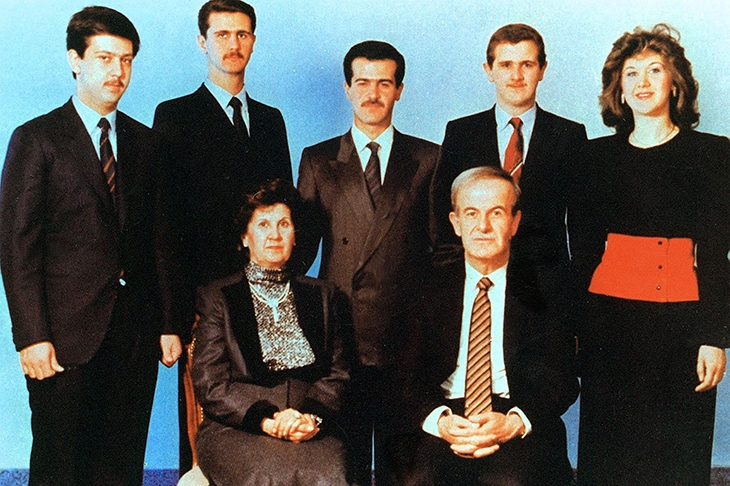‘How did this mild-mannered eye doctor end up killing hundreds of thousands of people?’ someone wondered about Bashar al-Assad in BBC2’s extraordinary three-part documentary A Dangerous Dynasty: House of Assad (BBC2, Saturday). It’s a question we’ve all occasionally pondered as the Syrian body count rose — 500,000 thus far — and as six million refugees fled the country. The answer is so lurid and complex that it could have come from one of Shakespeare’s tragedies.
Chinless, studious, polite Bashar was never meant to become president of Syria. His thuggish military officer father Hafez, who seized power in 1970, had earmarked the job for his dashing equestrian soldier son Bassel. But when Bassel was killed in a car crash, the reluctant Bashar (rather in the manner of Michael Corleone replacing his elder brother Sonny) was forced to take on the role that would transform him inexorably from a healer to a killer of men (women, and children…).
In tragedy there is often a key moment where the protagonist is offered the chance to avoid his fate — ‘take it!’ we all urge silently from the stalls — but where instead, inevitably, he chooses the dark side. Bashar had several of these, most notably in 2011 when he gave an address to the Syrian parliament that might have saved his reputation and spared the lives of half a million people.
The speech was in response to an unfortunate incident in the town of Deraa when one of his distant cousins, head of the local secret police, had brutally beaten up some kids for spraying anti-regime graffiti on the walls. It was the Arab Spring and every Middle Eastern leader was paranoid and jumpy. But this, Bashar’s former culture minister recalled, would have been his chance to leap on to the riderless wild horse of revolution and take charge: he could establish himself as the region’s voice of reform.
He would have been helped, hugely, by his charming, charismatic, photogenic wife Asma, who that same year had been the subject of a glowing Vogue feature. And understandably so. Though of middle-class Syrian stock, she had been raised in Britain with a perfect accent, a first-class degree in computer science, and a career in investment banking ahead of her. She was the Middle East’s Princess Di and shared both her reforming zeal and common touch, once travelling incognito round Syria to enlighten herself as to ordinary people’s concerns.
Just imagine the double act the al-Assads might have made. But it was not to be. Like Michael Corleone, Bashar was a prisoner of his genetic stock: his dad was such a psycho that he used to force his male soldiers to demonstrate their obedience by stabbing puppies to death on parade and his female ones to bite the heads off live snakes; mum was a wicked manipulator in the manner of Livia Soprano; his younger brother Maher is another psychopath who likes personally to shoot unarmed demonstrators with a sniper rifle and instigates most of the regime’s atrocities. So when the time came for Bashar to give his speech to parliament, blood proved thicker than water.
Hard to believe that at that point — only seven years ago — Syria was still a very peaceful place. But quickly the violence escalated. One hapless 13-year-old boy’s body was returned to his parents dotted with cigarette burns and minus his penis — courtesy of the Assad regime. Protestors handing out flowers were machine-gunned. The opposition coalesced behind various Islamist groups, each committing atrocities of their own. Soon, swathes of the country lay in ruins.
‘I don’t think Bashar has ever been comfortable with brutality,’ said one observer. Quite possibly not. Those who have met him — such as the BBC’s Jeremy Bowen — have testified to an old-fashioned courteousness, which sits quite at odds with those barrel bombs and sarin gas massacres. And yet, and yet, it’s Bashar’s name at the bottom of documents, smuggled out of Syria, authorising such inexcusable, fell deeds.
Perhaps the saddest thing about this fascinating documentary was realising just how completely avoidable the Syrian conflict was. A bit more diplomacy here, a few more concessions there, and Syria might now be a beacon of peace and stability instead of a basket case. But in real life, as in fiction, that’s not how tragedy works. As someone once said, there’s a divinity that shapes our ends, rough-hew them how we will.







Comments